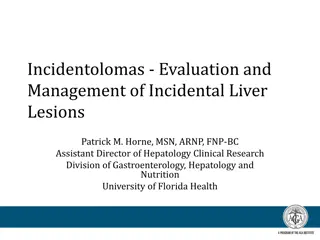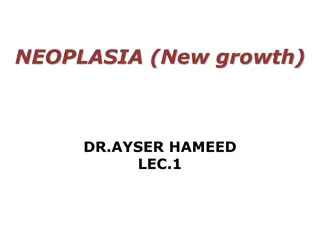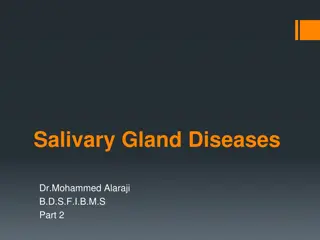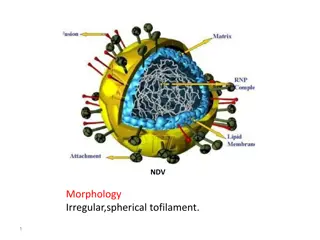Understanding Anaerobic Infections: A Case Study in Clinical Microbiology
In this case study, two patients present with fever, neck pain, and previous misdiagnoses of viral pharyngitis. Blood cultures reveal anaerobic growth, with Gram stain showing pleomorphic Gram-negative rods. Anaerobic cultures require specialized conditions for growth, such as anaerobic glove box in
1 views • 14 slides
Understanding Salmonella: A Zoonotic Pathogen
Salmonella, a genus of bacteria, includes species causing various diseases in humans, cattle, sheep, goats, and poultry. The pathogen can be transmitted through contaminated food and is classified into typhoidal and nontyphoidal serovars. Nontyphoidal serovars are common and typically lead to self-l
0 views • 20 slides
Evaluation and Management of Incidental Liver Lesions
Understanding the natural history, evaluation, and management of benign liver lesions is crucial for diagnosing incidental liver findings. Common benign liver lesions include hepatic hemangioma, focal nodular hyperplasia, hepatic adenoma, and hepatic cyst. Differential diagnosis plays a key role in
0 views • 37 slides
Microscope Focusing and Bacteria Morphology Guide
Learn how to focus a microscope for simple staining, understand the morphology of bacteria such as cocci, bacillus, spirals, and pleomorphic shapes, and discover the process of preparing a slide smear with detailed steps and images.
0 views • 11 slides
Understanding Neoplasia: Characteristics and Nomenclature of Tumors
Neoplasia, or new growth, is characterized by uncoordinated growth exceeding that of normal tissues, persistent growth independent of stimuli, loss of responsiveness to growth controls, and local expansion regardless of host environment. Tumors are classified into benign and malignant categories in
0 views • 36 slides
Overview of Salivary Gland Tumors and Diseases
Salivary gland diseases, including tumors, can affect both major and minor glands. These tumors may be benign or malignant, with common benign tumors like pleomorphic adenoma. Clinical features of salivary gland tumors vary, with slow-growing benign tumors being more common. Pleomorphic adenoma is p
0 views • 27 slides
Understanding the Morphology and Genome Organization of NDV
NDV, a pleomorphic virus, has an irregular spherical shape with filamentous features. Its genome consists of a single-stranded RNA with six genes arranged in a specific order. The virus contains a lipoprotein envelope with short spikes and a helical nucleocapsid core to protect the RNA. The genomic
0 views • 35 slides
Understanding Rickettsial Diseases: Epidemiology, Pathogenesis, and Clinical Features
Rickettsiae are pleomorphic intracellular coccobacilli with unique parasitic behavior, leading to vascular lesions and systemic manifestations in humans. The infections are spread by insect vectors and are characterized by fever, headache, malaise, skin rash, and organ enlargement. Different types o
0 views • 21 slides







